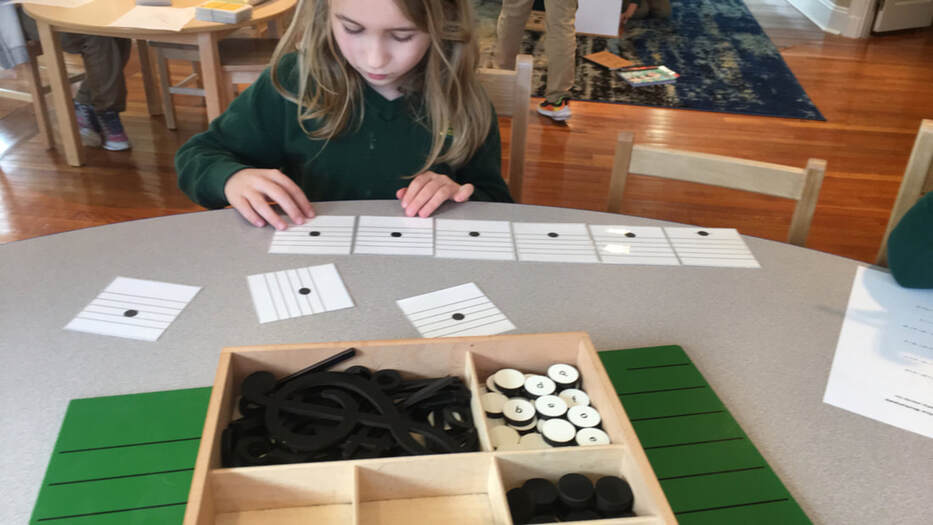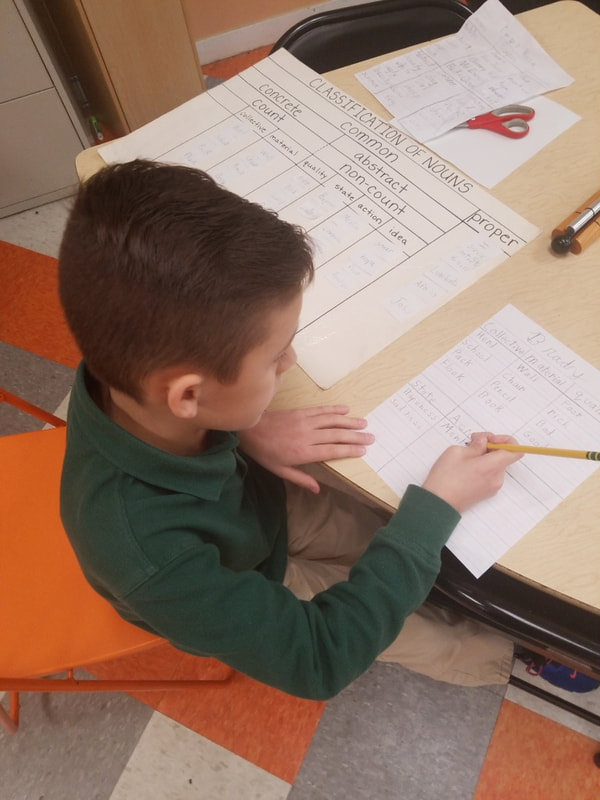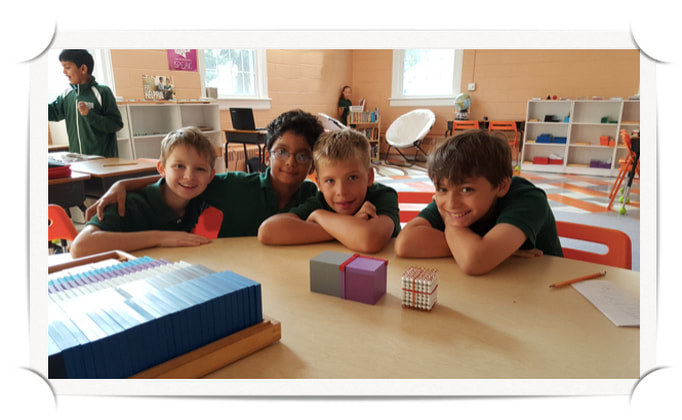Elementary ProgramMontessori Seeds of Education is what should be known as “traditional education.” It embodies a holistic style of both teaching and learning. However, before getting into that it is important to note what one of the challenges is with traditional education. Montessori Seeds of Education understands that families feel disconnected from their children’s education.
Parents drop their child off at school and they step into a world where teachers must educate them under time constraints and very restrictive guidelines. This leaves no room for their creativity to grow or to nurture their individual gifts. Parents are then left to manage their child’s extracurricular activities coupled with hours of homework, which is given to their child because of unfinished work from school. This leaves parents and teachers exhausted and feeling increasingly ineffective. |
Children are learning from their earliest educational experience that their value and aptitude for intelligence only comes down to the measurement of tests. It is for this reason that Montessori Seeds of Education exists. With that said, there are three tasks that we strive to accomplish.
- The first objective of Montessori Seeds of Education is to shine the light on the educational paradigm that was created during the Industrial Revolution. We do this by empowering our teachers with the tools and training that they need to create opportunities for children to sow their own seeds for the benefit of their individual development.
- The second objective is to encourage collaboration between families, teachers and external resources. This is achieved through effective communication, the use of multi-media and regular opportunities to participate in unique educational excursions.
- The third objective is to embody a common vision. With a shared common and holistic vision, we have a map to follow in order to achieve a unified goal. The unified goal is to be both an observer and active participant in order for your child to be a successful and fulfilled inter dependent contributing member to society.
Lower Elementary (Ages 6-9)
Upper Elementary (Ages 9-12)
With a stronger sense of themselves as individuals, children in our Elementary program work together and learn to see the world from different perspectives. Through materials, curriculum and targeted activities, our AMI-certified teachers cultivate negotiation skills, trust, and a strong sense of empathy.
MSOE offers a Lower Elementary Program for children ages 6 to 9 and an Upper Elementary Program for ages 9 to 12. Both are designed to appeal and respond to the universal characteristics of elementary-age children, including their:
Individualized Learning
The ‘standardized curriculum’ - the hallmark of conventional education - divides knowledge into discreet, compartmentalized subject areas and limits the child to learning ‘pieces and parts’ in a prescribed order, at a prescribed pace. In contrast, a Montessori education gives Elementary children a broad, inter-disciplinary context for learning that allows each child to learn at his or her own most natural and productive pace. Students can advance rapidly in areas of strength while taking extra time to master and revisit material that may be more challenging. In Montessori’s individualized, mixed-age setting, the child works freely without feeling (or being labeled) either ‘ahead’ or ‘behind.’
Interdisciplinary, Self-Directed Learning
Students are provided with a broad, interdisciplinary context for learning through presentations of Montessori’s “Great Lessons,” which typically are shared with larger groups in a formal, storytelling format. More detailed information is presented in small group “Key Lessons.” Key lessons pave the way for deeper learning by inspiring student-initiated research projects and independent study, which can be pursued in small groups, individually, or with a friend.
Lessons in subject areas such as mathematics, language, history, geometry, geography and biology are presented in small groups or to individual students. Lower Elementary children typically spend more time with subject-specific manipulative materials, while older children work at increasingly higher levels of abstraction. Art, music, and foreign language are integrated seamlessly into the student’s daily work.
Whenever possible, the teacher endeavors to present lessons when a child is at peak readiness – one student will have seen an older child do something more advanced and want to know more, while another will realize that new skills or knowledge are needed to make progress on a favorite project. In all cases, lessons are presented at a level of challenge tailored to the student’s abilities and interest.
The Montessori Elementary teacher actively follows, supports and records each child’s progress and ensures that all children cover the full curriculum over the course of the three-year Lower or Upper Elementary program. MSOE students are expected, at a minimum, to master the components of the public school curriculum, and in addition, are exposed to an open-ended Montessori curriculum that encourages them to explore their interests in depth, make connections across subjects and experience the thrill of discovery.
Social Learning
The mixed-age classroom provides children with many opportunities to find work partners (younger, same age, or older) who share their interests or learn at a similar level and pace. Age differences also create unique learning opportunities: older children can consolidate their knowledge by mentoring and teaching younger children and can strengthen their leadership skills by modeling appropriate behavior, mediating conflicts and leading large projects. Younger children, in turn, can find inspiration for higher-level studies by seeing what their older classmates can do, and often teach themselves by ‘tagging-along’ with older, more knowledgeable classmates.
Learning in the Community
Students are encouraged to extend their studies and research projects beyond the walls of the classroom and to engage with the wider world of local business, service organizations, libraries, museums and natural habitats. Elementary students regularly plan their own “going outs” to find answers to their research questions or to serve the community in ways that have personal meaning.
Upper Elementary (Ages 9-12)
With a stronger sense of themselves as individuals, children in our Elementary program work together and learn to see the world from different perspectives. Through materials, curriculum and targeted activities, our AMI-certified teachers cultivate negotiation skills, trust, and a strong sense of empathy.
MSOE offers a Lower Elementary Program for children ages 6 to 9 and an Upper Elementary Program for ages 9 to 12. Both are designed to appeal and respond to the universal characteristics of elementary-age children, including their:
- overwhelming curiosity
- ability to think abstractly and use logic and reason
- strong and active imaginations
- preference for learning material in multiple ways, instead of by rote repetition
- great desire to expand their social skills and work with others
- strong sense of fairness and justice
Individualized Learning
The ‘standardized curriculum’ - the hallmark of conventional education - divides knowledge into discreet, compartmentalized subject areas and limits the child to learning ‘pieces and parts’ in a prescribed order, at a prescribed pace. In contrast, a Montessori education gives Elementary children a broad, inter-disciplinary context for learning that allows each child to learn at his or her own most natural and productive pace. Students can advance rapidly in areas of strength while taking extra time to master and revisit material that may be more challenging. In Montessori’s individualized, mixed-age setting, the child works freely without feeling (or being labeled) either ‘ahead’ or ‘behind.’
Interdisciplinary, Self-Directed Learning
Students are provided with a broad, interdisciplinary context for learning through presentations of Montessori’s “Great Lessons,” which typically are shared with larger groups in a formal, storytelling format. More detailed information is presented in small group “Key Lessons.” Key lessons pave the way for deeper learning by inspiring student-initiated research projects and independent study, which can be pursued in small groups, individually, or with a friend.
Lessons in subject areas such as mathematics, language, history, geometry, geography and biology are presented in small groups or to individual students. Lower Elementary children typically spend more time with subject-specific manipulative materials, while older children work at increasingly higher levels of abstraction. Art, music, and foreign language are integrated seamlessly into the student’s daily work.
Whenever possible, the teacher endeavors to present lessons when a child is at peak readiness – one student will have seen an older child do something more advanced and want to know more, while another will realize that new skills or knowledge are needed to make progress on a favorite project. In all cases, lessons are presented at a level of challenge tailored to the student’s abilities and interest.
The Montessori Elementary teacher actively follows, supports and records each child’s progress and ensures that all children cover the full curriculum over the course of the three-year Lower or Upper Elementary program. MSOE students are expected, at a minimum, to master the components of the public school curriculum, and in addition, are exposed to an open-ended Montessori curriculum that encourages them to explore their interests in depth, make connections across subjects and experience the thrill of discovery.
Social Learning
The mixed-age classroom provides children with many opportunities to find work partners (younger, same age, or older) who share their interests or learn at a similar level and pace. Age differences also create unique learning opportunities: older children can consolidate their knowledge by mentoring and teaching younger children and can strengthen their leadership skills by modeling appropriate behavior, mediating conflicts and leading large projects. Younger children, in turn, can find inspiration for higher-level studies by seeing what their older classmates can do, and often teach themselves by ‘tagging-along’ with older, more knowledgeable classmates.
Learning in the Community
Students are encouraged to extend their studies and research projects beyond the walls of the classroom and to engage with the wider world of local business, service organizations, libraries, museums and natural habitats. Elementary students regularly plan their own “going outs” to find answers to their research questions or to serve the community in ways that have personal meaning.
|
631 Chester Ave. Moorestown, NJ | 08057 | 609-832-2546
M.S.O.E. is a registered non-profit 501(c)3 organization. |
NOTICE OF NON-DISCRIMINATORY POLICY AS TO STUDENTS
Montessori Seeds of Education, Inc. does not discriminate on the basis of race, ethnicity, color, religion, creed, sex, age, national origin, physical or mental disability, marital status, changes in marital status, pregnancy, parenthood, sexual orientation, gender identity or veteran status. Montessori Seeds of Education, Inc. does not discriminate on the basis of sex in violation of Title IX of the Education Amendments of 1972 in the educational programs or activities, which it operates. Montessori Seeds of Education, Inc. does not discriminate on the basis of disability in violation of Section 504 of the Rehabilitation Act of 1973. This includes admission or access to, or treatment or employment in its programs, services, and activities.
© Montessori Seeds of Education. All rights reserved.
Montessori Seeds of Education, Inc. does not discriminate on the basis of race, ethnicity, color, religion, creed, sex, age, national origin, physical or mental disability, marital status, changes in marital status, pregnancy, parenthood, sexual orientation, gender identity or veteran status. Montessori Seeds of Education, Inc. does not discriminate on the basis of sex in violation of Title IX of the Education Amendments of 1972 in the educational programs or activities, which it operates. Montessori Seeds of Education, Inc. does not discriminate on the basis of disability in violation of Section 504 of the Rehabilitation Act of 1973. This includes admission or access to, or treatment or employment in its programs, services, and activities.
© Montessori Seeds of Education. All rights reserved.



